

The purpose of this page is to verify the conversion of characters from a given font to Unicode characters. It is mainly for advanced users or programmers.
Column 1 displays characters in the font and column 3 displays the corresponding hex values.
Column 2 displays the corresponding Unicode characters and column 4 displays the Unicode values.
On each row, if the font character is displayed well, the Unicode character should be the same as the font character. If it is different, the conversion is incorrect and needs to be fixed.
To this end, you must left-click on the Unicode character twice, then right-click to display a menu and select another Unicode character that looks similar to the font character. If a character appears blank or as an empty box, it does not mean the conversion is necessarily incorrect. Rather, it can be Windows that can't display it for some reason. In this case visual inspection is impossible, but the hex values listed in columns 3 and 4 can help you verify the conversion. If a value is wrong, double click on it to manually enter the correct value, if you know what it is.
Changing an entry in column 1 will adjust column 3 automatically and vice versa.
Changing an entry in column 2 will adjust column 4 automatically and vice versa.
You can change font or font size in column 1 or 2 by right-clicking on the appropriate column header. Normally, column 1 should be in the font listed in the combobox at the top of the dialog.

Entries in column 1 can be edited with the help of a pop-up font table. To do this, first left click on the entry twice, then right click to choose the appropriate menu "Select a font char".
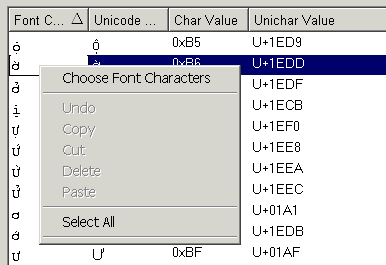
Note that if you left click only once then right click, the "Choose a font char" menu is grayed out. This means you cannot edit the cell; you have to double click on the cell.
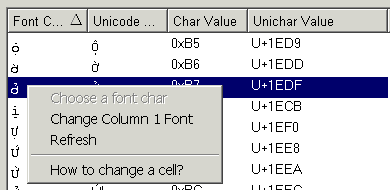
Entries in column 2 can be edited with the help of a pop-up font table. To do this, first left click on the entry twice, then right click to choose the appropriate menu "Select a Unicode char".
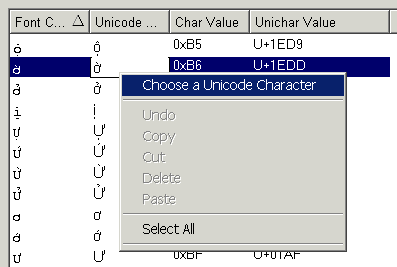
Note that if you left click only once then right click, the "Choose a Unicode char" menu is grayed out. This means you cannot edit the cell; you have to double click on the cell.
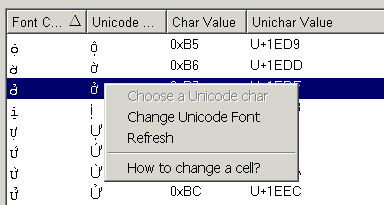
Columns 3 and 4 are intended for advanced users or programmers. They offer manual edit capability only. Users can double click on a cell and type in directly the character value in hex or the Unicode value in hex.
You can add a missing font character by clicking on the "Add Row" button.
You can sort the table by the first or second or third or fourth column. This is done by clicking on the header of the appropriate column.
If you make any changes to the conversion table, you must save them using the dropdown menu from the downward arrow on the "Conversion File" button. Otherwise, the disk file is unchanged and all the changes will be lost. Before you make any change to a conversion file, you should back it up first. This is done via the menu "Back Up Conversion File". Later if you change your mind, you can always restore the backup by selecting "Restore Conversion File From Backup".
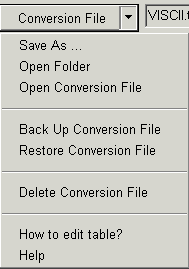
If you understand the process, you can edit/modify font conversion files directly with an editor such as Notepad. The font conversion files are all .txt files in the directory <INSTALLDIR>\Fontsets